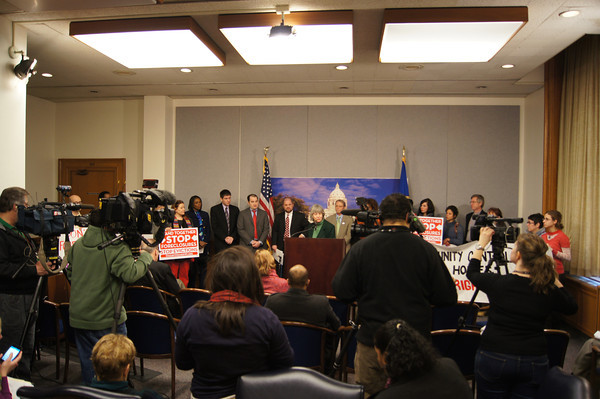
First housing bill heard in Legislature would curb foreclosure abuses
At a packed Capitol press conference Wednesday morning, Rep. Karen Clark (DFL-Minneapolis) asked “how many in this room live near a home that’s been foreclosed?” Nearly every hand in the room went up. “It affects all of us,” Clark concluded.
Statewide statistics tell a similar story. According to Clark, 22,000 Minnesota families lost their homes to foreclosure in 2011. If DFL legislators have their way, homeowners in the process of foreclosure will have additional protections and a streamlined process to prevent abusive practices.
Three homeowners who have been fighting for their homes told their stories to the Legislature on Wednesday, pushing for this legislation. HF83 would ban a process called “dual tracking,” provide additional protection against foreclosure for veterans, require mandatory mediation if requested by a borrower, and require banks create a single point of contact for homeowners in foreclosure.
Dual tracking is when one part of a bank works with a homeowner who is behind on their mortgage on a refinance or loan modification, while another part of the bank is working to foreclose on the homeowner.
Rep. Mike Freiberg (DFL-Golden Valley) is the chief author of HF83. He got involved in this issue because of the struggles of one of his constituents, Rose McGee of Golden Valley. She was working with a mortgage company in good faith to modify a a mortgage while another person at the company was moving forward with foreclosure proceedings. “Dual tracking [is] where someone with the mortgage holder is ostensibly working to help you refinance your loans so you can stay in your home while someone else who is not talking to you during that whole process is basically tying to kick you out of your house. To me, this seems kind of immoral. I don’t see any good business justification for this process,” Rep. Freiberg said.
St. Paul homeowner Caylin Crawford described how she was injured and contacted her bank before she was late on any payment. She was told “the only way we can help you is if you are in default, so if you stop paying your mortgage then we’ll modify your loan for you. So I did, because why would the bank lie to me? Immediately, they started foreclosure proceedings.”
Crawford detailed how she was shuttled back and forth between US Bank and Freddie Mac. Eventually her home was sold at a sheriff’s sale, but she was told by the bank not to worry about that, that they were working with her to avoid losing her home.
“I was told we can’t help you until after the redemption period, I was told so many different things, and I got an eviction letter in July, a summons to eviction court, at that point I realized they were serious about kicking me out of my house,” Crawford said.
She filed a lawsuit and joined forces with Occupy Homes, and was finally able to get Freddie Mac to agree to a negotiated settlement. “It shouldn’t have taken 56 people standing on my lawn, hours and hours of canvassing my neighborhood to get my community to stand behind me to bring Freddie Mac to the table,” Crawford told the committee. “This foreclosure was not my fault. I did what the bank told me to do. And they’re making money on kicking me out of my home,” Crawford concluded.
Ann Haines, a St. Paul homeowner, told a similar story. She was told to go into default before she could get help to modify her mortgage. She’s been trying for months to keep her home while fighting for a loan modification. “Now, we’re just working with my attorney to see if they will reverse the foreclosure. Where we stand right now, I do not know,” Haines said.
As the foreclosure tsunami broke over Minnesota after the 2008 financial crisis, little was done by a Republican-led Legislature. Rep. Clark’s choice to highlight HF83 as the first bill heard in the House Housing Finance and Policy Committee illustrates the sea change in the direction of the Minnesota Legislature that comes as the DFL takes control.
Last session, you might have seen a lobbyist from the Chamber of Commerce or the banking industry flanking a Republican member presenting a bill drafted for the benefit of the industry. Today, the stories of people whipsawed by unfair, confusing, and contradictory processes as they sought to avoid foreclosure in good faith were at the center of the process. Banking lobbyists lined a wall at the back of the room, scowling.
Quite a change, indeed.
Thanks for your feedback. If we like what you have to say, it may appear in a future post of reader reactions.



